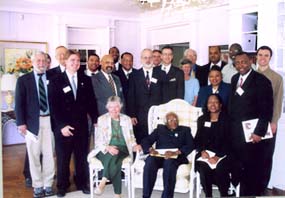Eighty-eight seconds. One thousand bullets. Ten injured. Five dead. Lots of confused and angry people. The Greensboro Massacre began and ended on Nov. 3, 1979, but the confused and angry people remain.
On Sept.3, a young Guilford alumnus named Scott Pryor spoke in the Moon Room about the massacre and the Greensboro Truth and Community Reconciliation Project (GTCRP.) He addressed a group of about 30 students, professors, and community members. He showed a movie about the massacre and the GTCRP and discussed both with the audience.
“I just happened to be in Greensboro that day,” was Max Carter’s response when the audience was asked how they heard about the events of Nov. 3. Most had readabout it in class.
Pryor is a member of the GTCRP National Advisory Committee, which is based on a South African model and is the first project of its kind in the U.S.
The project “hope[s] that it will provide opportunities for the entire city to heal and to come to a clear understanding of the events of Nov. 3 and their aftermath.” GTCRP initiators believe that it might “open new possibilities for Greensboro to become a better, more just, and compassionate city.”
The project consists of electing seven people of integrity to a Truth and Reconciliation Commission. These people will have 15 months to examine documents regarding Nov. 3, invite people to come forth and share information, and take other appropriate measures.
Their discoveries will be the basis for a 6- to 12-month-long community dialogue that hopefully will engage the public and help dispel the division, confusion, and negative feelings that surround the event.
The Greensboro Massacre took place on an overcast Saturday. The Communist Workers Party gathered for a march to protest the Ku Klux Klan and to gain support for an upcoming labor conference. A caravan of Klan members and American Nazis arrived and fired at the protestors, killing five people and wounding 10 others.
There were three trials. At the first state trial, six Klan members were indicted for murder. An all- white jury found them innocent. The public was outraged and a federal criminal trial was requested. At the federal trial, the defendants were again found innocent.
Finally, at a federal civil trial, two Nazis, five members of the Klan, and two police officers were found guilty for conspiracy to commit assault and battery. Questions, as well as mistrust of the police force and other institutions, still linger in Greensboro.
Controversy surrounds the GTCRP. Greensboro’s current mayor, Keith Holiday, opposes it.
“We are doing everything in our power to show a good image to the outside world,” said Holiday. He says he doesn’t know how to talk about the incident without “pulling up some pretty negative, bad images.” Other people think the project is doomed because the Truth and Reconciliation Commission has no legal authority.
Pryor said of the project, “as you know from your classes at Guilford, once you start talking about the truth, it’s like opening a huge can of worms.

